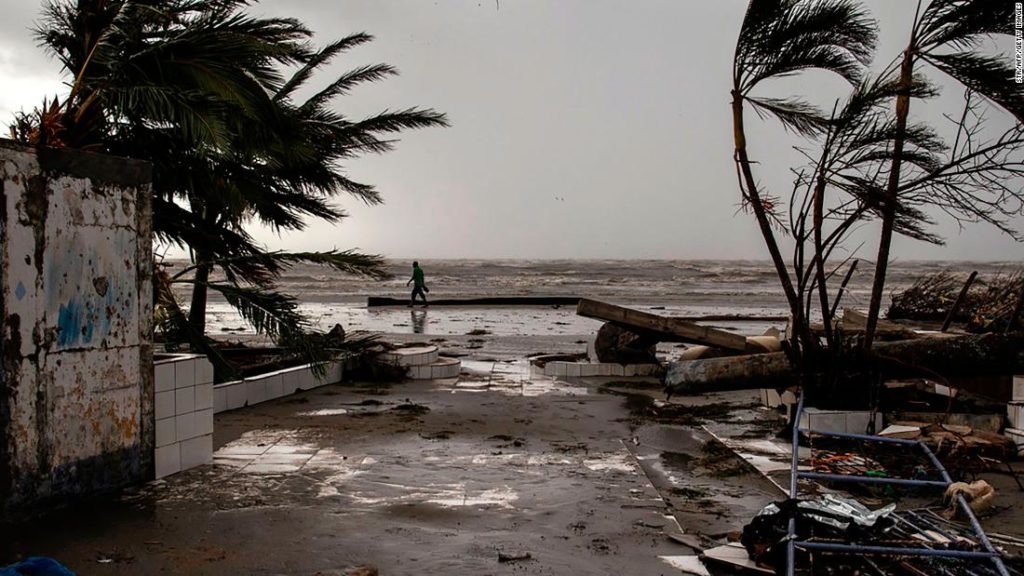Exacerbated by the coronavirus pandemic, the fallout from these climate disasters will continue to spread. And it may eventually even reach distant countries, as Central Americans left desperate and vulnerable by the storms flee abroad.
Three million people have been affected by Eta and Iota, the Red Cross estimates, and hundreds of thousands of people have been evacuated and displaced. Dozens are dead and missing. Add Covid-19 to the strains on crowded evacuation shelters, and it’s a recipe for another perfect storm.
“The risk of Covid-19 spreading will only increase as more seek refuge in shelters, already crowded with more than 17,500 Guatemalans from the last storm,” Miriam Aguilar, Guatemala representative for humanitarian aid organization, Mercy Corps, said last week.
From Honduras, Dr. Maria Angélica Milla, who specializes in nutrition, had her colleague show CNN a makeshift evacuation shelter in an elementary school in San Pedro Sula, where people could be seen wearing no masks and keeping no safe distance. Cardboard boxes lay spread out on the floor—makeshift mattresses for so many families who lost everything.
About 180 displaced people have taken shelter there, Milla added, and the coronavirus is often the least of their concerns. Hunger looms, she said. Kids who depended on a meal at school aren’t even getting that, since schools have been closed due to the pandemic and even more so now with the hurricanes, she said.
Basic necessities, like shelter and clean drinking water, are the most pressing needs for many, UNICEF’s representative in Honduras, Mark Connolly also told CNN.
Mirza Yolany Valdez, a full-time mother, lost everything during Hurricane Eta. She has been at the elementary school with her two sons aged 11 and three have been at the same elementary school in San Pdro Sula ever since.
“I’m just praying that God gives me strength because it’s super sad to go home and have nothing,” she told CNN in a video call.
Her voice cracked, and she began to cry. “With the first hurricane I couldn’t rescue anything and now with the second, even less.”
‘Famine is coming’
“People don’t know where to go now,” says Leonardo Pineda, Director of a local Honduran NGO, Asociación Juventud Sigle Veintiuno (JUSIVE) in San Pedro Sula.
He tells CNN he’s been hearing a lot of young people talk about migrating.
“There is no work, so in what will people work? They look precisely for something to help them grow and in Honduras this is difficult,” Pineda said.
During the interview, a torrential downpour could be seen and heard in the background — the rains that make recovery efforts even more difficult.
Steve McAndrew, Red Cross deputy regional director for the Americas, described the scope and breadth of the hurricane damage as “really overwhelming” to CNN.
“We know from history, we know from Hurricane Mitch and other major disasters like this that it only increases people’s desperation to seek out better opportunities elsewhere,” he said, referring to the 1998 storm so deadly it became the basis for special US immigration status for Hondurans and Nicaraguans.
“This can definitely increase all those pressures for people to move.”
In a meeting last week, Guatemalan president Alejandro Giammattei and Honduran president Juan Orlando Hernández called on the world’s wealthiest nations directly contributing to climate change to help their countries recover from the hurricanes with financial assistance. This in turn would help mitigate a large migration flow north, Giammattei said.
“Every time there is a natural disaster as a result of climate change, we acquire debt,” Giammattei added. “This has brought on a vicious cycle where we get in debt, we reconstruct, it gets destroyed, we get into debt, we re-build and it get destroyed again.”
“Central America and Honduras are among the regions in the world most affected by climate change,” Honduran president Hernández said.
Dr. Milla has no doubt that the storms will launch new waves of migration — the only option for some to survive “apocalyptic” devastation on the ground, she says.
“Famine is coming,” she told CNN. “So much famine is coming because the last harvest was lost, there is no capacity to store anything, prices were already skyrocketing.”
“I don’t want to think about what’s going on through the minds of those who lost everything,” Milla added. “Prepare for the waves.”
You may also like
-
UK coronavirus variant has been reported in 86 countries, WHO says
-
NASA technology can help save whale sharks says Australian marine biologist and ECOCEAN founder, Brad Norman
-
California Twentynine Palms: Explosives are missing from the nation’s largest Marine Corps base and an investigation is underway
-
Trump unhappy with his impeachment attorney’s performance, sources say
-
Lunar New Year 2021: Ushering in the Year of the Ox

